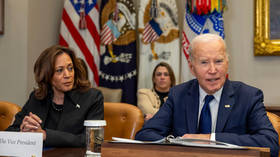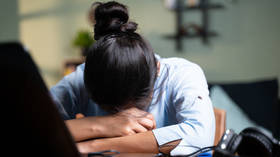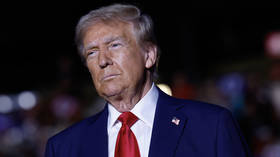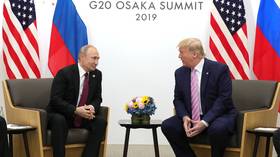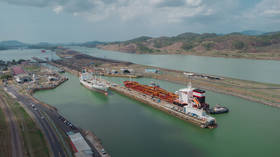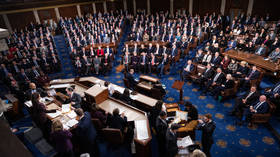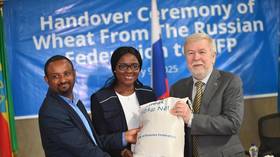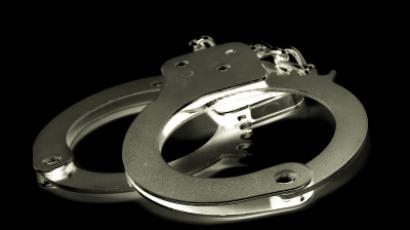Press-free NATO summit? Filming cops on the street illegal in Chicago
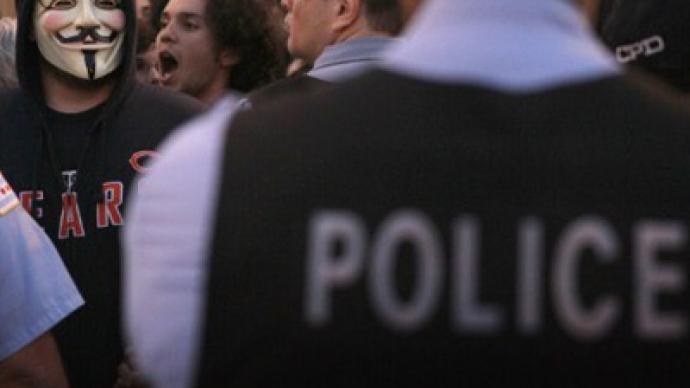
Chicago, Illinois plans to host more than 7,500 international dignitaries and 3,000 journalists at the G8 Summit this spring.
But if history is any indication, those numbers will be dwarfed by tens of thousands of demonstrators descending on the Windy City this year to protest the massive gathering of world leaders.And as police prepare to clash with protesters who picket the annual meeting of the minds, the crime scenes that are expected to be marred by messy arrests might never be made available outside of Chicago. In the state of Illinois, an obscure eavesdropping law prohibits recordings of unknowing individuals. Even if a cop is caught clobbering a protester on the streets of Chicago, recording the incident can land both amateur photographers and seasoned journalists alike behind bars, where they could face sentencing on par with charges of rape and murder.The law in question is an antiquated eavesdropping rule that can bring about felony charges for producing an audio recording without ones’ consent. Critics have come after the law and challenged its constitutionality — or lack thereof — but as of now the offense is on the books and is likely to stay that way come springtime. For the Chicago cops that will be tasked with controlling a swarm of protesters at the summit, it could be to their benefit. The same, sadly, can’t be said for the freedom of the press.To say Chicago will become the scene of a mass protest might be an understatement. By comparison, the 1999 World Trade Organization Ministerial Conference in Seattle, Washington spawned 600 arrests and prompted police to use tear gas, pepper spray and physical force on protesters. A decade later, the 2009 G-20 Summit in Pittsburg, Pennsylvania yielded 190 arrests and still more incidents of police violence. The same summit a year later in Toronto, Canada caused police to put more than 1,000 citizens in handcuffs, making it the largest mass arrest in the country’s history. With riots rendering nearly a million dollars worth of damages as well, it was also one of the biggest uprisings that Canada has seen in recent memory.With the Occupy Wall Street movement only heightening awareness of corrupt politics in America and across the globe, dissatisfaction with the establishment and its decisions that impact the world are more rampant than ever. Protesters are already planning how they will respond to the summit scheduled for this May, but under current law, video cameras that capture sound are just as illegal as assault weapons.Under the Eavesdropping Act in Illinois, catching a cop crack down on a protester is a Class 1 felony. If budding videographers think they might be the exception come this spring, think again.Christopher Drew thought he was exercising his First Amendment when he recorded an altercation with cops in 2009, but for the Chicago, Illinois artist, he couldn’t be further from the truth. He was approached by an officer with the Chicago Police Department three years ago and questioned about the artwork he was selling on the city’s State Street. When law enforcement realized that they were being recorded, Drew was dished felony charges under the eavesdropping law and ended up spending a few days in jail. Drew asked an Illinois judge to dismiss the hefty felony charge, but the court rejected his plea. Later this year his case is expected to go to trial, and if found guilty, Drew could serve 15 years in prison.“In a democracy you are suppose to oversee your public servants. If they’re doing wrong you’re suppose to bring it to the attention of other citizens and to the court,” Drew explained to RT. “They have no privacy right, they are in public and they are on the public dime and doing public duty. That means that we’re their employer. We have a right to record our employees and bring that evidence to the system that they are doing wrong.”Michael Allison has become a victim of the police state’s bizarre law, too. He was at his mom’s house in Illinois when cops showed up and questions the automobiles he had parked on the property. When Allison began recording his conversation with the cops, he was cuffed and charged with violating the eavesdropping law. Those charges included five counts of eavesdropping, each with a maximum of 15 years in prison.For videotaping his own conversation with a cop on his family property, Allison could have served the rest of his life behind bars. Circuit Court Judge David Frankland would later say that the case against Allison was unconstitutional, but that decision was just a small exception. The eavesdropping law still stands today, even if it has opponents sitting on judicial benches. “A statute intended to prevent unwarranted intrusions into a citizen’s privacy cannot be used as a shield for public officials who cannot assert a comparable right of privacy in their public duties,” the judge wrote.“Such action impedes the free flow of information concerning public officials and violates the First Amendment right to gather such information,” added Judge Frankland.Drew, Allison and Judge Frankland are just a small sampling of many opponents of the controversial law, but unless those numbers grow before the G8, the protests that are almost certain to be countered with excessive police force will be illegal to record. Some state lawmakers are trying to overturn the legislation before this spring, but it is a challenge that stands to be complicated with a goal only a few months into the future. Illinois Attorney General Lisa Madigan has asked the state Supreme Court for a new decision on the constitutionality of the law and others have come to her side. Some have even proposed an exception that will allow citizens to record the police, which is allowed in most jurisdictions in America."I don't believe there is an expectation of privacy for public officials on public property doing public duties," Rep. Elaine Nekritz, a local sponsor of the re-write, tells the Associated Press. The US Court of Appeals in Boston, Massachusetts countered a similar wiretapping law last year, with a judge ruling in August that filming the police is a “basic and well-established liberty safeguarded by the First Amendment.” Many outside of Boston agree, and if the law isn’t changed in Illinois before spring, Chicago’s G-8 summit is expected to still be caught on film, law notwithstanding. But as thousands plans to flood the streets of the city to demonstrate against the meeting of leaders from the US, France, Russia, Italy and elsewhere, cops will be tasked with countering not just riled protesters, with journalists of all sorts gripping their cameras. Come springtime, the Chicago PD will have to determine which First Amendment guarantee is more important to crush: the freedom of the press or the freedom to assemble. Luckily America’s most well-known constitutional law professor and former Chicago resident will be in town that week. What do you think Barack Obama has to say about the law?


